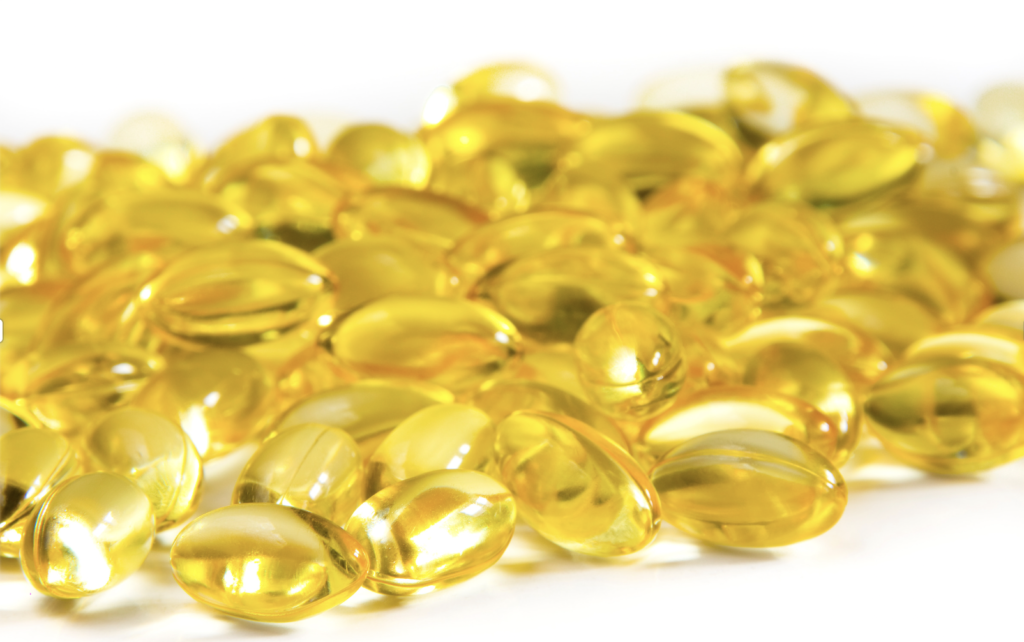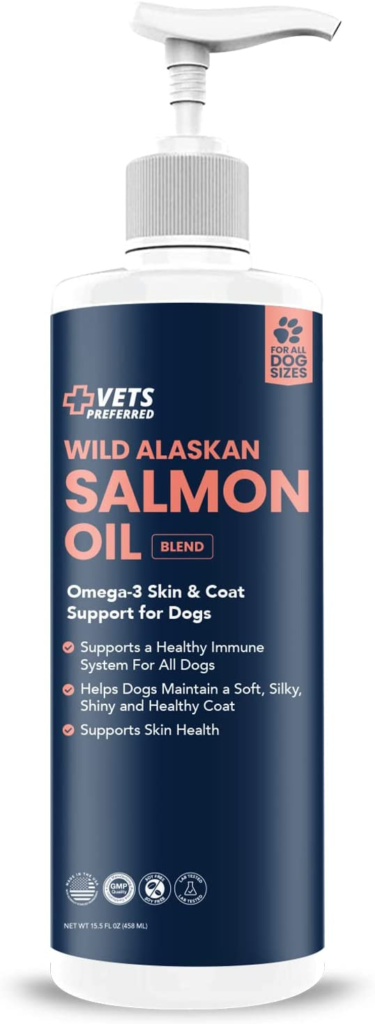News & Entertainment Nutrition & Recipes
I Almost Killed My Dog With Fish Oil—Internet Hoax or Real Risk?
Fish oil is widely marketed as a healthful supplement for your dog, but is this always the case?
We’ll explore the dangers of over-supplementing your dog, highlighting a horrifying real world story, and some of the unpleasant issues that supplements can cause. Then, we’ll show you some safe supplements and talk about how to give them to your dog the right way!
Don’t let the scary title fool you—you’ll complete this article feeling confident about how you supplement your dog.
Owner Causes Vitamin E Deficiency in Dog with Fish Oil

Neo the Neopolitan Mastiff’s journey to finding relief from excruciating pain caused by a vitamin E deficiency is a remarkable tale of perseverance and dedication. Neo’s owner, a loving and attentive caregiver, had been cooking his meals and giving him various supplements, including fish oil and glucosamine, to ensure he was always in the best of health. However, one supplement ended up almost costing Neo his mobility and wellbeing.
Lameness in back legs
It all began when Neo started showing signs of lameness in his back legs. His vet couldn’t find any underlying problem and suggested it might be arthritis, a common ailment in larger dogs. Neo was referred to an orthopedic specialist who also suspected arthritis but couldn’t pinpoint any specific issue. The specialist prescribed Rimadyl for pain and inflammation, but Neo’s condition continued to deteriorate, leaving him in excruciating pain.
Vitamin E deficiency
Neo’s owner refused to give up and continued to search for answers, scouring the internet for any information that might help her beloved pup. Eventually, she stumbled upon a rare condition in dogs – vitamin E deficiency – which can lead to extreme pain, muscle weakness, and lameness, among other symptoms. Neo exhibited many of these symptoms, and his owner wasted no time in starting him on vitamin E capsules.
Remarkably, within 24 hours, Neo began to show signs of improvement, and after a week, he was running, jumping, and playing without any pain. This discovery was life-changing for Neo, who had spent weeks suffering without any relief. It also highlighted the importance of thorough research and the dedication of pet owners who will stop at nothing to ensure their furry friends are healthy and happy.
Why Did This Happen?

Vitamin E and fish oil have a complex chemical relationship. Whenever you give your dog supplements, it’s important to think about how they interact with each other. For example, when taken together, fish oil and vitamin E can enhance each other’s benefits.
Fish oil And Vitamin E Enhance Each Other
Fish oil can increase the absorption and storage of vitamin E in the body, while vitamin E can help prevent the oxidation of omega-3 fatty acids in fish oil, which can reduce their effectiveness. But there is a balancing act, and if you give your dog fish oil without giving them Vitamin E as well, they can end up with a Vitamin E deficiency.
Omega-3 fatty acids like the kind found in fish oil, green-lipped mussel, and other supplements can increase a dog’s need for vitamin E. Most dogs aren’t given foods that are typically rich in vitamin E, so when offered fish oil without vitamin E, their body’s supply of the vitamin is quickly depleted.
Too Much Vitamin E Is Not Good Either
However, this doesn’t mean that you should be giving your dog tons of vitamin E, even if they are getting fish oil– too much vitamin E can cause an increase in your dog’s requirements for Vitamins A, K, and D. Too much vitamin E can also cause hemorrhaging since it acts as a blood thinner. It’s all about making sure that your dog gets the right nutrients in the right combination for their health.
Is Fish Oil Safe for Dogs?
As a supplement or ingredient, fish oil is safe for dogs. However, as the case with Neo the mastiff shows, it is possible to over-supplement your dog! Make sure that you’re using the correct dose for any supplements you offer; your vet can help you make the right decisions.
Benefits of Fish Oil for Dogs
There are lots of great reasons to use fish oil for dogs. Benefits include, but are not limited to the following:
| Coat and Skin | Fish oil’s omega-3 fatty acids keep the skin healthy and moisturized. |
| Joint Health | Omega-3 fatty acids help reduce inflammation in the joints, which may relieve stiffness and pain. |
| Brain Health and Development | The Omega-3 fatty acids in fish oil are important for brain development and function, and may help improve cognitive function in aging dogs. |
| Immune System Function | Fish oil can help boost your dog’s immune system, making them less susceptible to illnesses and infections. |
| Heart Health | Omega-3 fatty acids can help reduce the risk of heart disease in dogs by lowering blood pressure and improving circulation. |
| Eye Health | Omega-3 fatty acids are important for eye health and can help prevent certain eye disorders, such as dry eye and cataracts. |
| Allergies | Allergies are one of many reasons people use fish oil for dogs. Itchy skin and inflammation are both symptoms of allergies that may be reduced with fish oil. |
How Much Fish Oil Should You Give a Dog?
The amount of fish oil you should give your dog depends on their weight and the concentration of omega-3 fatty acids in the fish oil. The recommended dose of fish oil is 75-100 milligrams per kilogram of your dog’s bodyweight.
Your dog’s maximum daily dose is 310(kg)¾. Going over that can lead to vomiting, diarrhea, reduced immune function, and other side effects. It is important that you tell your vet that your dog is taking fish oil– they may have recommendations!
Here is what the Canine Arthritis Foundation recommends as a daily dose for dogs of different sizes.
| Dog’s Weight in Pounds | Dog’s Weight in Kilograms | Recommended Dose | Maximum Dose |
| 5 | 2.3 | 230 mg | 574 mg |
| 10 | 4.5 | 450 mg | 965 mg |
| 20 | 9.1 | 910 mg | 1623 mg |
| 30 | 13.6 | 1360 mg | 2200 mg |
| 40 | 18.2 | 1820 mg | 2740 mg |
| 50 | 22.7 | 2270 mg | 3227 mg |
| 60 | 27.3 | 2730 mg | 3700 mg |
| 70 | 31.8 | 3180 mg | 4153 mg |
| 80 | 36.4 | 3640 mg | 4590 mg |
| 90 | 41 | 4100 mg | 5014 mg |
| 100 | 45.5 | 4550 mg | 5427 mg |
| 110 | 50 | 5000 mg | 5829 mg |
What are The Side Effects of Fish Oil for Dogs?
When taken appropriately, the risk of side effects of fish oil for dogs is extremely low. Some owners do notice a fishy odor on their dog’s breath, which is unpleasant but harmless. However, if you give your dog too much fish oil, you can run into problems (like Neo’s owner from the story). In addition to vitamin E deficiency, too much fish oil can cause gastrointestinal distress and bleeding disorders.
Also, while lots of pet parents use fish oil to help with skin allergies, some dogs are allergic to fish oil! If you see your dog scratching at their skin or see swelling or hives, stop giving them fish oil and talk to your vet about a possible allergy.
What is the Best Fish Oil for Dogs?
There are lots of fish oil supplements out there, but not all of them are ideal for dogs. Human fish oil supplements don’t always have vitamin E added because our diets do include more foods that are rich in vitamin E. Here is a selection of some of the best fish oil for dogs. Amazon is a good place to find these supplements, or you can look for them in your local pet shops or animal nutrition stores by searching for “fish oil for dogs near me” to see what is locally available.
Wild Alaskan Salmon Oil from Vets Preferred

Buy On Amazon | $19.97

You might be wondering what “tocopherol” is. It’s vitamin E! Mixed tocopherol is four sources of vitamin E mixed together in an easily digestible way that’s great for a canine supplement.
Ingredients:
- Salmon oil
- Fish oil (from pollock)
- Mixed Tocopherol
“The One” from Front of The Pack

“The One” This supplement, which contains krill oil, is the REAL DEAL! I know this company and they invest in top notch vet nutritionists to develop their products.
It’s not loaded with fillers (95% active ingredients which is extremely good) + it’s made in USA by people who actually care.

It’s called the “The One” because it’s the only supplement your dog will need with 12 powerful clinically proven ingredients. Also, it’s a powder which is another reason I think it’s the best dog supplement for homemade food.
Ingredients
- Whole Antarctic Krill
- Glucosamine (Shellfish free)
- Chondroitin
- Curcumin
- Ashwaganda extract
- Organic Brown Kelp
Fish Oil for Dogs FAQ
Can I give human fish oil to my dog?
Yes! It’s fine to use human fish oil for dogs. Just make sure that you’re giving an appropriate dose and that you are using fish oil with vitamin E.
Is fish oil good for dogs every day?
Yes! You can include fish oil as a daily supplement for your dog.
How much vitamin E should I give my dog with fish oil?
The best fish oil for dogs already has vitamin E in it. If you want to give your dog a vitamin E supplement in addition to fish oil that doesn’t have this vitamin included, talk to your veterinarian about your dog’s nutritional requirements.
Is krill oil for dogs a good replacement for fish oil?
Not really, they do different things. Krill oil and fish oil are both excellent sources of omega-3 fatty acids, which are essential for dogs’ overall health and well-being. However, krill oil and fish oil contain different types of omega-3 fatty acids, and the benefits of each vary.
Krill oil is an excellent source of EPA and DHA, which are two essential omega-3 fatty acids that have been shown to have anti-inflammatory properties, promote heart health, improve joint health, and support cognitive function. Additionally, krill oil contains a potent antioxidant called astaxanthin, which can help reduce oxidative stress and inflammation in the body. Astaxanthin has been linked to several health benefits, including improved heart health, cognitive function, and immune system function. Astaxanthin is the pigment that gives krill oil its reddish color.
Fish oil, on the other hand, is a rich source of EPA and DHA but doesn’t contain astaxanthin. However, fish oil has been shown to help reduce inflammation and improve heart, joint, and cognitive health in dogs.
In general, both krill oil and fish oil can provide similar health benefits for dogs. However, the quality and purity of the oil, as well as the dosage, are essential factors to consider.
Related Articles:
- Could Your Dog Be Allergic to Chicken?
- The Best Dog Supplements for Skin & Coat Available on Amazon
- 10 Best CBD Dog Treats on the Market
- Salmon Dog Food Recipes You Can Make at Home



